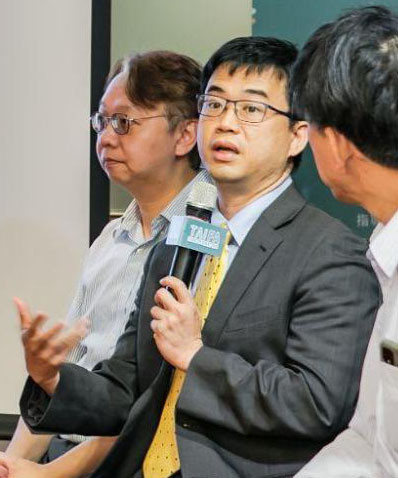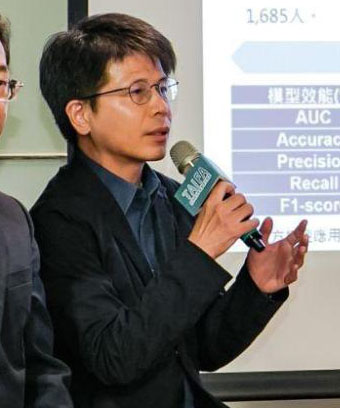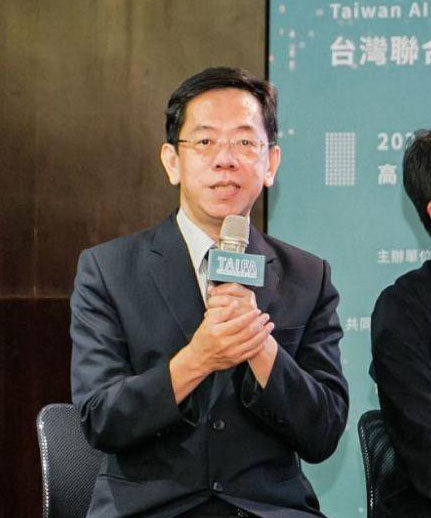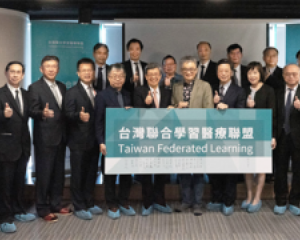Federated learning has become the key core of the Generative AI era.

The Taiwan AI Federated Learning Alliance (TAIFA), also known as the Alliance, held its inaugural annual conference on the 15th at the Kaohsiung Software Park, under the guidance of the National Development Council, the National Science and Technology Commission, and the Taiwan AI Labs. The conference brought together cooperation units from industry, government, academia, research, and medical institute to jointly present the technology and applications of federated learning and showcase the achievements of the federated learning platform. Distinguished officials, including Deputy Minister Kao Shien-Quey of the National Development Council, Chief Secretary Lin Guang-hong of the National Science and Technology Council, and Deputy Mayor Luo Da-sheng of Kaohsiung City, attended the event. Medical centers such as National Taiwan University, Taipei Veterans General Hospital, Chang Gung Memorial Hospital, Kaohsiung Medical University, Tri-Service General Hospital, Chi Mei Medical Center, National Cheng Kung University Hospital, China Medical University Hospital, Kaohsiung Chang Gung Memorial Hospital, and others participated in the conference. Additionally, hospitals such as Xiaogang Hospital, Datong Hospital, Yuan’s General Hospital, Children’s Hospital, and Tzu Chi Hospital were also invited to participate. Through federated learning, the intelligence of Taiwan’s medical community, from medical centers to regional and local hospitals, was brought together to accelerate the popularization and implementation of smart healthcare.
The National Development Council initiated the establishment of the Taiwan AI Federated Learning Alliance across ministries in 2020. Deputy Minister Kao Shien-Quey mentioned during her speech, “It is an honor to work with the National Science and Technology Council, the Ministry of Economic Affairs, and other industry-government-academia elites to establish the AI Federated Learning Industry.” With the emergence of ChatGPT, the world has focused on the trend of artificial intelligence-driven digital transformation, and Taiwan has taken the lead in actively developing trustworthy technology. Deputy Minister Kao acknowledged that the Alliance has set a global trend, successfully established highly responsive medical data governance standards, and, leveraging technological strengths and democratic development, accelerated industrial development while ensuring the protection of personal data and maintaining information security. The achievements of federated learning have significant implications for Taiwan; for example, Taiwan faces a serious aging problem, and healthcare expenditure is growing by billions annually. The increasing demand for long-term care will bring tremendous pressure, but AI collaboration may bring about a turning point.
Furthermore, Taiwan has robust ICT capabilities, and generative AI leads to increased demand for advanced Taiwanese chips and AI servers. By integrating AI application services with the medical and biotechnology industries, Taiwan possesses a formidable advantage in international competition. Deputy Minister Kao also proposed that Taiwan should establish a second “Huguo Shenshan” (AI silicon valley), focusing not only on hardware like semiconductors but also on software and service applications. The federated learning platform and the trustworthy AI technology supply chain for intelligent and precise healthcare are critical industries that Taiwan must master in the future.
 ↑Deputy Minister of the National Development Council, Kao Shien-Quey
↑Deputy Minister of the National Development Council, Kao Shien-Quey
Trustworthy AI Drives Responsible Technology
Since its establishment in 2021 by the National Development Council and the Taiwan AI Labs, the Alliance has actively promoted federated learning applications in areas such as healthcare, urban-rural transportation, finance, manufacturing, and cultural commerce. The data governance advantage of federated learning lies in enabling AI algorithms to gain experience from vast amounts of data from different sources without directly sharing sensitive information with each other. In the era of generative AI and exploding information, information security, personal data protection, and data authenticity become crucial issues for responsible and trustworthy AI.
In addition, AI model training must address biases in the model. Training solely in one domain can lead to accuracy loss when applied to a different domain. Through federated learning platforms, AI model training can overcome data security concerns, allowing collaborative training without exporting data from local sources. Following the principles of verifiability, it further achieves comprehensive AI applications and domain certification, resolving the issue of third-party models’ inability to execute across institutions.
President of the Taiwan AI Federated Learning Alliance and Founder of the Taiwan AI Labs, Ethan Tu, expressed that data governance will be the next decisive factor in the industry amidst the surge of generative AI. The Alliance aims to be a wave maker and a pioneer in the generative AI era, leading various industries in Taiwan to join the federated learning community and establishing shareable, traceable, interpretable, and trustworthy AI modules based on their respective fields and needs.
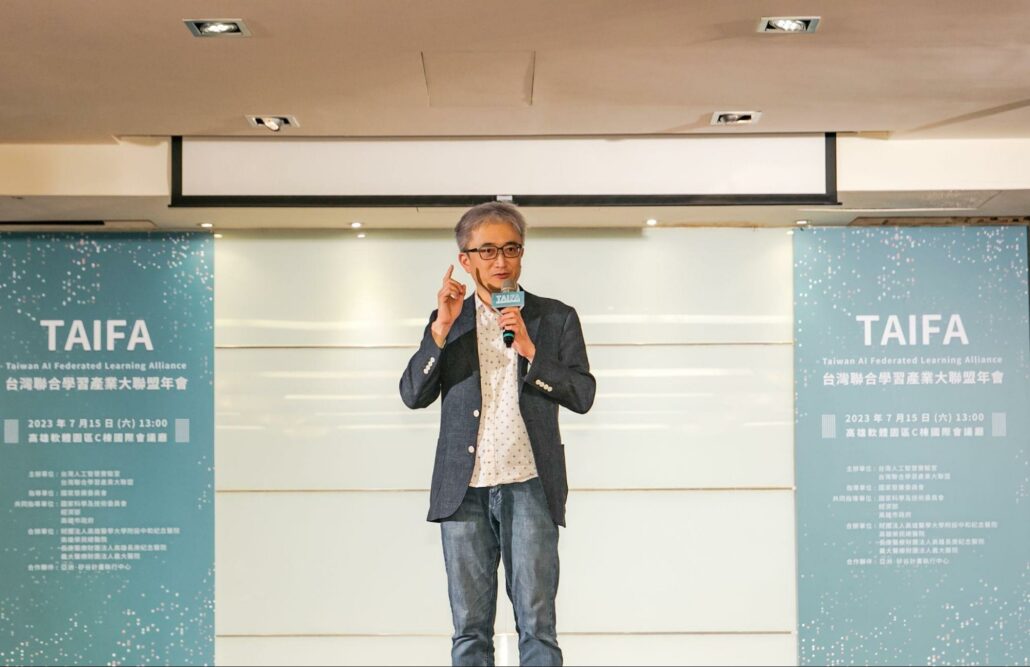 ↑President of the Taiwan AI Federated Learning Alliance and Founder of the Taiwan AI Labs, Ethan Tu
↑President of the Taiwan AI Federated Learning Alliance and Founder of the Taiwan AI Labs, Ethan Tu
Originating from Taiwan, a Global Landing of Significant Business Opportunities
During the annual conference, Chang Chih, currently serving as the Chief Operations Officer of the Taiwan AI Labs, shared how the federated learning platform is being linked with international partners. For instance, the medical imaging product, DeepChex, has become a collaborative partner with the United Nations’ vital agency, StopTB, making it the first Taiwanese institution to receive such recognition. StopTB, which was established in 2001 and previously managed by the World Health Organization (WHO), is now an important organization under the United Nations Office for Project Services (UNOPS). It encompasses 1,500 international governments, NGOs, and medical groups with the aim of eradicating global tuberculosis. The trustworthy, traceable, and verifiable artificial intelligence models trained using Taiwan AI Labs’s federated learning data governance technology will contribute to global healthcare.
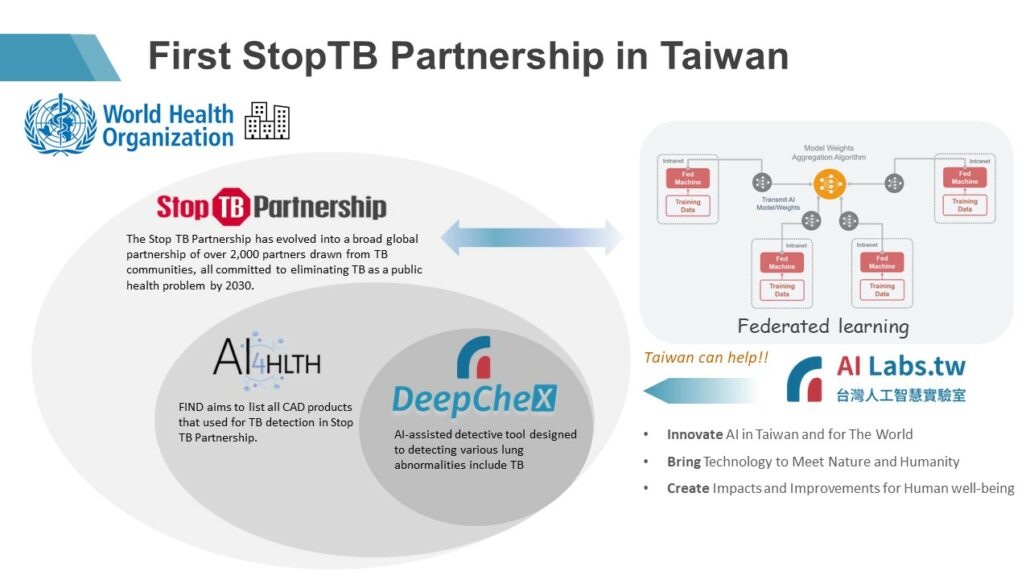 ↑Taiwan AI Labs’s DeepChex Allies with UN Important Agency StopTB.
↑Taiwan AI Labs’s DeepChex Allies with UN Important Agency StopTB.
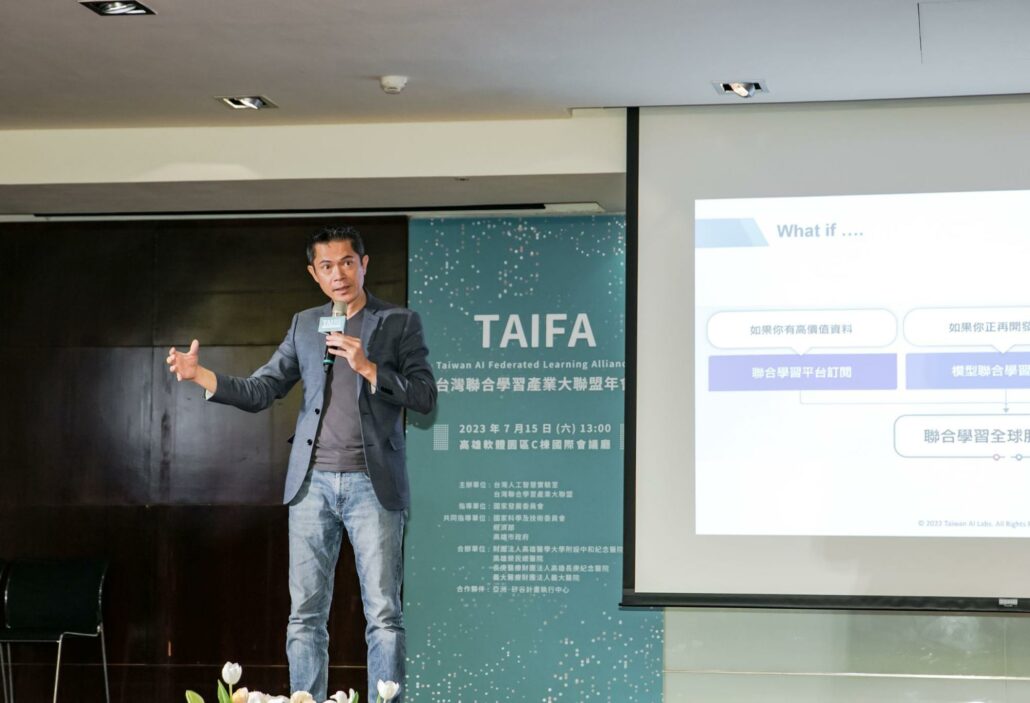 ↑Chief of Operation Officer of Taiwan AI Labs Eric Chang
↑Chief of Operation Officer of Taiwan AI Labs Eric Chang
The Taiwan AI Labs has further integrated into the supply partner network of the U.S. Center for Disease Control and Prevention (CDC), where it has established a system for predictive epidemiology and outbreak analysis through public health machine learning models. Collaborating with DSFederal in the United States, the Taiwan AI Labs has supported the research and development of Dr. Edwin Michael’s team from the University of South Florida (USF) using federated learning technology. Additionally, due to their extensive experience in machine learning model development, the Taiwan AI Labs has also been involved in the development of outbreak analysis models.
Moving forward, they plan to establish an outbreak analysis system in 92 counties in the United States. Leveraging the advantages of federated learning, the AI models will achieve cross-regional generalization, allowing for future expansion not only across the entire United States but also to every country.
↑Taiwan AI Labs Joins the Centers for Disease Control and Prevention (CDC) Project in the United States.
This year, Henry Rodriguez, Assistant Director for Strategic Health and Cancer Science, in the Executive Office of the President at the White House, who is also the Founding Director of the Office of Cancer Clinical Proteomics Research at the National Cancer Institute, NIH, visited Taiwan AI Labs to explore the potential for establishing top-tier international medical collaborations using the federated learning platform. The National Cancer Institute (NCI) is the primary federal agency in charge of cancer research and training in the United States and has been jointly promoting the Cancer Moonshot Program with Taiwan’s Academia Sinica. Henry Rodriguez and his team shared their experiences in cancer treatment clinical trials, with the goal of using trustworthy artificial intelligence to establish collaborative applications in areas such as brain tumor diagnosis and multi-gene risk modeling.
↑Assistant Director for Strategic Health and Cancer Science, in the Executive Office of the President at the White House, Henry Rodriguez.
↑Henry Rodriguez observes Taiwan AI Labs’s federated learning and AI solutions for medical imaging and other applications.
The National Science Council Integrates Two Major Medical Alliances.
The alliance has pioneered the federated learning model, setting a standard example in the field of smart healthcare. The National Science Council supports the Taiwan Clinical Trials Consortium (TCTC) and the Taiwan Smart Healthcare Alliance (TSHA). The Ministry of Economic Affairs has established the Kaohsiung Federated Learning Smart Healthcare Industry Alliance to launch the AI Smart Healthcare Project and create the world’s first medical generative AI industry cluster. By combining Taiwan’s strong medical achievements with Kaohsiung’s four medical centers, the metal center, and the Southern Science Park, the results of federated learning are flourishing throughout the region.
The Taiwan Clinical Trials Consortium (TCTC) is led by the Director Wu Ming-Shiang of the National Taiwan University Hospital. The infection consortium within TCTC is closely collaborated by Vice President Chang Shang-chwen and the Taiwan AI Labs in technology-driven epidemic prevention. During this collaboration, Professor Sheng-Wen Huang and Professor Chien-Chang Lee from the National Taiwan University Hospital shared that the initiative started with National Taiwan University and expanded to include branches like the Hsinchu Branch and Yunlin Branch, along with other hospitals such as Fu Jen Catholic University Hospital, Taoyuan General Hospital, Mackay Memorial Hospital, and Taipei Medical University Shuang Ho Hospital. The consortium conducted cross-institutional validation and learning for the COVID-19 prognostic module, predicting a thirty-day all-cause mortality rate for confirmed patients. Each hospital provided relevant data, including medical records and images, and underwent federated verification to facilitate rapid training, validation, and confirmation of the AI module’s effectiveness. The platform’s achievements are already supporting the use of international pharmaceutical companies.
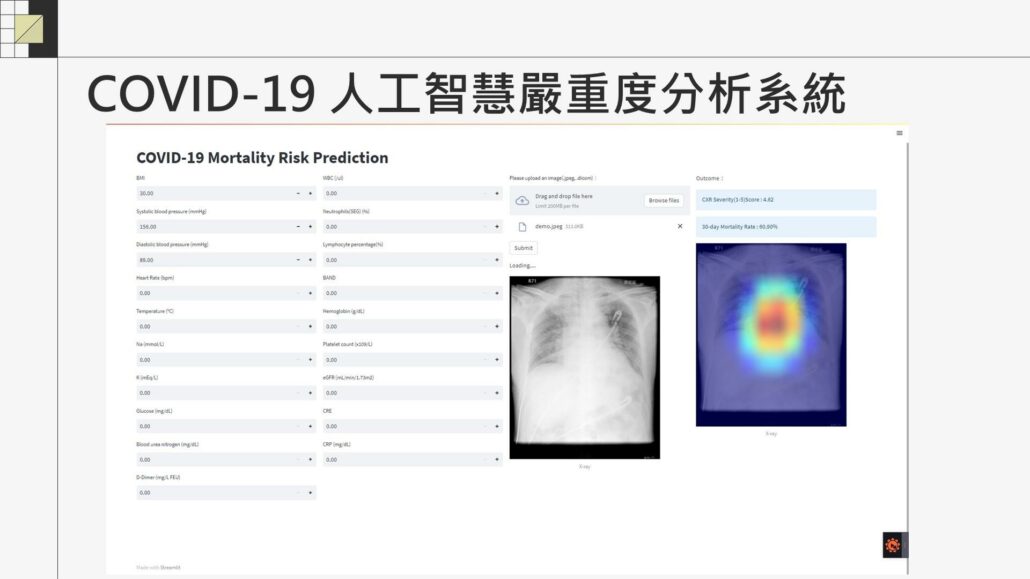
↑The Taiwan Infection Clinical Trial Collaboration Alliance, initiated by Professors Sheng Wang-Huei and Lee Chien-Chang from National Taiwan University Hospital, developed the COVID-19 prognosis prediction model.
|
|
Led by Dr. Chen Shih-an, the President of Taichung Veterans General Hospital, the Taiwan Smart Healthcare Alliance (TSHA) has presented research on pulmonary hypertension. The alliance includes Taipei Veterans General Hospital, Far Eastern Memorial Hospital, Kaohsiung Medical University Chung-Ho Memorial Hospital, and Chi Mei Hospital, all sharing the results of federated learning. Professor Hu Yu-feng from Taipei Veterans General Hospital trained a clinical disease detection model for pulmonary hypertension, using AI for real-time analysis of electrocardiograms as a screening tool, thereby improving the diagnosis rate for pulmonary hypertension. The model has undergone clinical evaluation at Taipei Veterans General Hospital and external validation through the alliance, including Taichung Veterans General Hospital, National Cheng Kung University Hospital, and overseas hospitals in Japan. Dr. Guo Guan-hong from Far Eastern Memorial Hospital trained a brain tumor segmentation model, initially conducting the first round of federated learning training using data from Far Eastern Memorial Hospital and Taipei Veterans General Hospital. Subsequently, data from Taichung Veterans General Hospital, Hualien Tzu Chi Hospital, and E-Da Hospital were included in the second round of federated learning training. The results showed that the model’s performance significantly improved at the alliance hospitals, and Dr. Guo proceeded to a third round, using data from National Taiwan University Hospital, which was not included in the training data. The results further demonstrated a significant performance improvement in the model at National Taiwan University Hospital, validating the model’s generalizability.
|
|
|
The “Cardiac Arrest Sudden Death Prediction Model” predicts high-risk individuals for cardiac arrest within a year, enabling clinical physicians to promptly examine and treat patients to improve survival rates. Dr. Tsai Wei-chung from Kaohsiung Medical University Hospital used electrocardiogram data to predict sudden death cases. As sudden cardiac arrest cases are relatively rare, data from a single hospital are insufficient to train a mature and stable model, resulting in reduced performance when applied to other hospitals. However, with the help of federated learning developed by the Taiwan AI Labs, the model was retrained and optimized using data from partner hospitals such as Chi Mei Hospital, Changhua Christian Hospital, and Far Eastern Memorial Hospital, restoring its original performance level or even improving it. The model can now meet the usage requirements of various hospitals, and its research results have been published in international journals. Dr. Liu Chung-feng from Chi Mei Hospital led the establishment of the “Prediction Model for the Timing of Ventilator Weaning” at the hospital’s AI center. This model uses multiple features of respiratory care to predict whether patients can successfully wean from ventilators. With the inclusion of the federated learning platform, the model can be customized and adjusted to meet the needs of other alliance hospitals, such as Kaohsiung Medical University Hospital, Changhua Christian Hospital, and Shin Kong Memorial Hospital, overcoming the problem of model discrepancies. This model has also received recognition from the National Invention Award.
|
|
|
Kaohsiung Establishes the World’s First Generative AI Supply Cluster
Press conference held in Kaohsiung Software Technology Park this morning, officially announcing the launch of the world’s first generative AI medical Industry cluster in Kaohsiung’s Asia New Bay Area. The Alliance is based on Taiwan AI Labs’ cutting-edge AI technology and is a collaboration between four major medical centers:Kaohsiung Medical University Chung-Ho Memorial Hospital(KMUH), Kaohsiung Chang Gung Memorial Hospital,Kaohsiung Veterans General Hospital(KSVGH), and E-DA Hospital, along with the Metal Industries Research & Development Centre and Southern Taiwan Science Park. It is further linked to local universities, including National Cheng Kung University and National Sun Yat-sen University, focusing on federated privacy and contribution verification algorithms. With full support from Kaohsiung City Government and the Ministry of Economic Affairs’ Department of Technology, the alliance aims to establish the world’s first exemplar of generative AI applied to innovation in the medical field.
The four medical centers in Kaohsiung have formed a close federated learning research alliance. Dr. Shang-Jyh Hwang, Vice President of KMUH, stated that federated learning breaks down barriers between medical centers, effectively safeguarding medical data privacy while connecting Kaohsiung’s abundant medical resources. Dr. Chih-Che Lin, Vice President of Kaohsiung Chang Gung Memorial Hospital, expressed gratitude to the city government and the alliance for enabling the fruitful results of smart medical achievements in Kaohsiung. Dr. Yao-Sheng Chen, Vice President of KSVGH, looks forward to the successful cases of federated learning in Kaohsiung being replicated overseas and shared with people worldwide. Mr. Yi-Ting Tsai, Chief Strategy Officer of E-DA Hospital, mentioned that the collaborative learning platform developed by Taiwan AI Labs will be the most effective solution for generative AI medical models.
↑Dr. Shang-Jyh Hwang, Vice President of KMUH(upper left)、Dr. Yao-Sheng Chen, Vice President of KSVGH(upper right)Dr. Chih-Che Lin, Vice President of Kaohsiung Chang Gung Memorial Hospital(lower left)、Mr. Yi-Ting Tsai, Chief Strategy Officer of E-DA Hospital(lower right)
The team led by Dr. Shang-Jyh Hwang, Vice President of KMUH, utilizes AI to analyze diabetic retinopathy images and physiological data to predict the occurrence and progression of nephropathy. Through the federated learning platform, they collected nearly ten thousand images to train the model and statistically analyze relevant correlations. This enables them to predict patients’ disease risks and intervene early. Similarly, Dr. Yi-Wen Chiu, Director of KMUH, uses AI to predict blood pressure and complications in dialysis patients. By collecting records including basic information, lifestyle habits, and dialysis history through the federated learning, they provide a future one-hour blood pressure prediction system and combine it with complication predictions. This aids medical professionals in assessing the possible causes of complications and providing appropriate interventions.
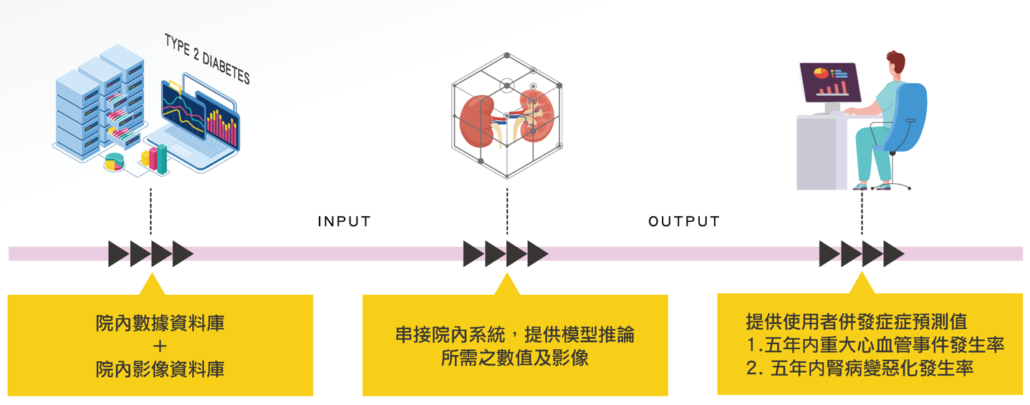
↑Diabetes Nephropathy Risk Prediction System,KMUH
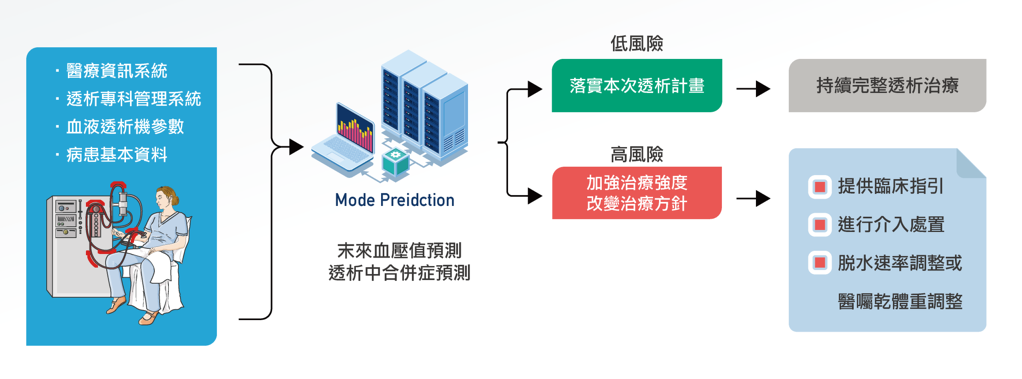 ↑Personalized Blood Pressure and Complication Prediction for Dialysis Patients,KMUH
↑Personalized Blood Pressure and Complication Prediction for Dialysis Patients,KMUH
For the treatment of ischemic stroke, time is of the essence. AI models help avoid missing the critical treatment window and enhance the quality of stroke treatment. Kaohsiung Chang Gung Memorial Hospital is currently the medical center in Taiwan that collects the most computed tomography scans for stroke. With the help of federated learning across institutions, Dr. Wei-Che Lin has developed the “Cerebral Ischemic Stroke Diagnosis and Prognosis AI Assistant System.” Medical professionals can use the AI model to quickly identify patients in need of urgent treatment.
The “Diabetes Cardiovascular Complication Risk Prediction System” utilizes deep learning to analyze patients’ past blood and urine test records, along with diabetic retinopathy images. With the aid of federated learning, Dr. Chen-Kai Chou at Kaohsiung Chang Gung Memorial Hospital established a predictive model based on data from over 15,000 diabetic patients, including those from three other medical centers in Kaohsiung. This effective model identifies high-risk populations for complications, allowing for early intervention and treatment to prevent or reduce subsequent complications and mortality.
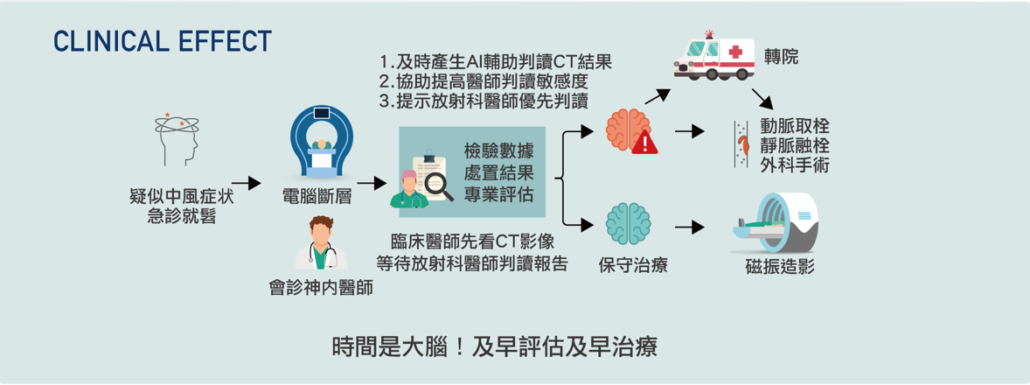
↑Cerebral Ischemic Stroke Diagnosis and Prognosis AI Assistant System,Kaohsiung Chang Gung Memorial Hospital
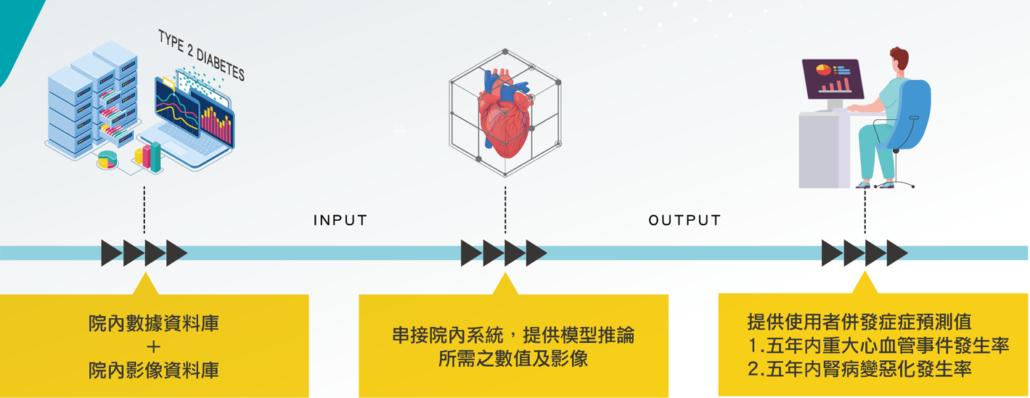
↑Diabetes Cardiovascular Complication Risk Prediction System,Kaohsiung Chang Gung Memorial Hospital
Acute pruritus is commonly seen in clinical practice, and in some severe cases, it can develop into systemic diseases. Without timely and accurate diagnosis and treatment, it may lead to serious consequences. Dr. Chien-Hui Hong of KSVGH plans to establish the “Acute Pruritus Knowledge and Medical Service Platform ” through federated learning. This platform allows lesions to be photographed and uploaded, providing real-time pruritus classification and possible pathogenic factors or treatment plans.
In-hospital cardiac arrest (IHCA) detection is an important quality indicator for monitoring and maintaining the safety of inpatients. Dr. Wei-Chun Huang, Head of the Intensive Care Medicine Center, and Director Wang-Chuan Zhuang of the Quality Management Center at KSVGH, applied the federated learning platform to input training and test datasets to train the “Pre-Hospital Cardiac Arrest Early Warning AI Model.” This early warning system regularly evaluates patients’ vital signs, and when patients show warning signs, it notifies the emergency and critical care teams for early detection and intervention.
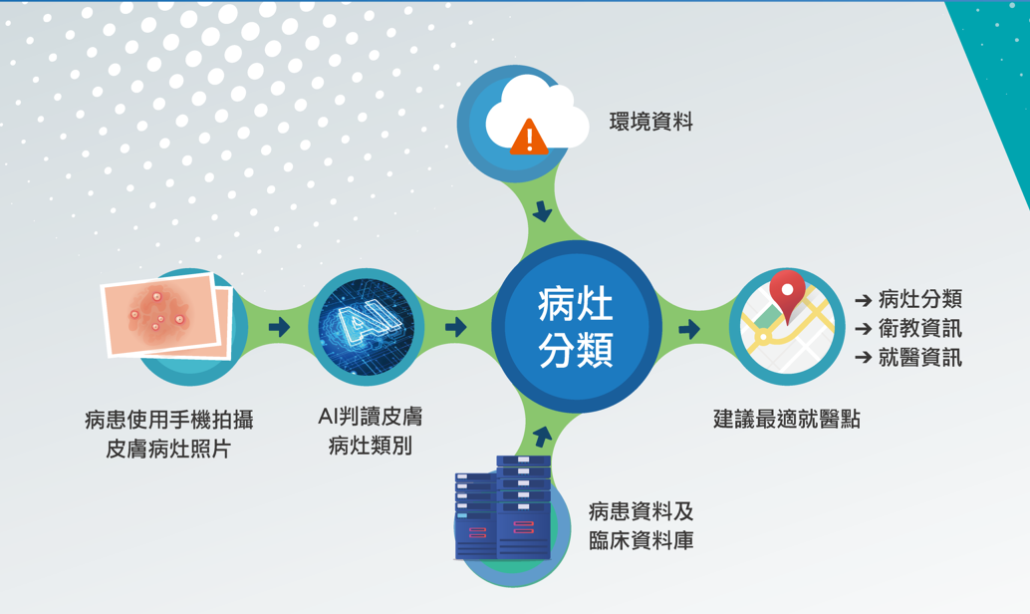
↑Acute Pruritus Knowledge and Medical Service Platform,KSVGH
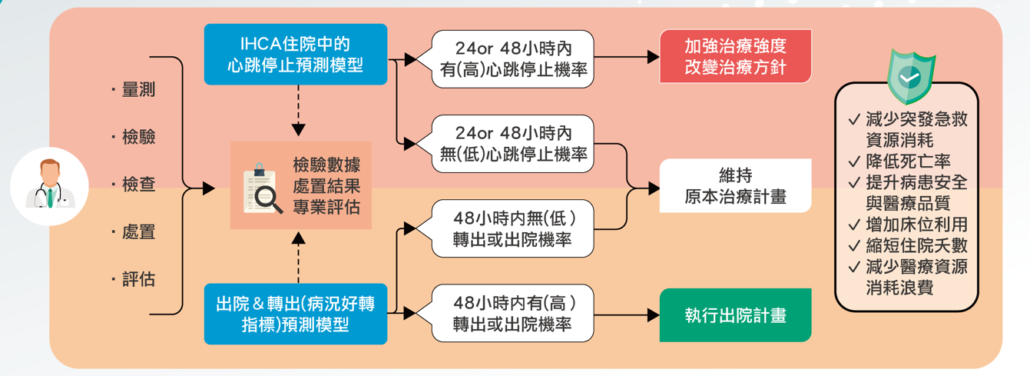
↑Pre-Hospital Cardiac Arrest Early Warning AI Model,KSVGH
In Taiwan, 80% of osteoporosis patients are not treated despite being at significant risk for fragility fractures. Dr. Hong Wei-Jie, Director of E-Da Hospital, initiated the “Bone Density Prediction System” project, using ten thousand data sets as training and validation data to establish the model. By utilizing the model, high-risk cases of osteoporosis can be predicted, enabling timely treatment to reduce the occurrence of subsequent fragility fractures. Early diagnosis and treatment can help lower mortality rates and mitigate the loss of life functionality in the long term.
Director Yi-Ping Xiang of E-Da Hospital demonstrated the “All-in-One Intelligent Drug Recognition System.” This research utilizes federated learning for AI recognition training to create a drug intelligence recognition system capable of identifying up to 6,000 drug items. This system assists clinical physicians and healthcare teams in accurately and safely assessing patients’ current medications, thereby elevating the quality of patient care.

↑Bone Density Prediction System,E-Da Hospital
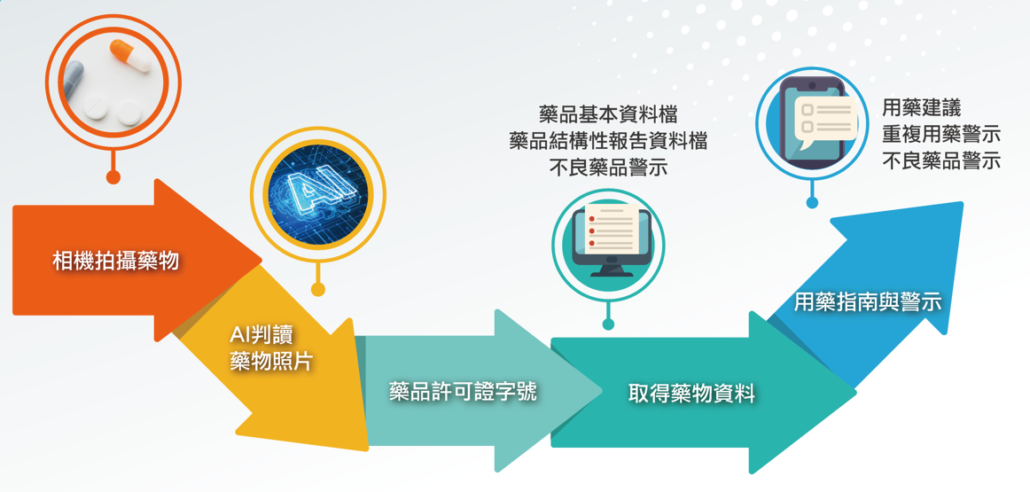
↑All-in-One Intelligent Drug Recognition System,E-Da Hospital
Lixel, in collaboration with advanced intelligent medical materials and holographic 3D technology, has launched a medical solution that allows 3D images to be viewed in naked-eye 3D floating in the air. The on-site demonstration showcased long-distance 3D cardiac medical image consultations, enabling individuals from different locations to simultaneously view the same 3D floating images, facilitating joint examination and editing, and establishing a new form of long-distance medical consultation.
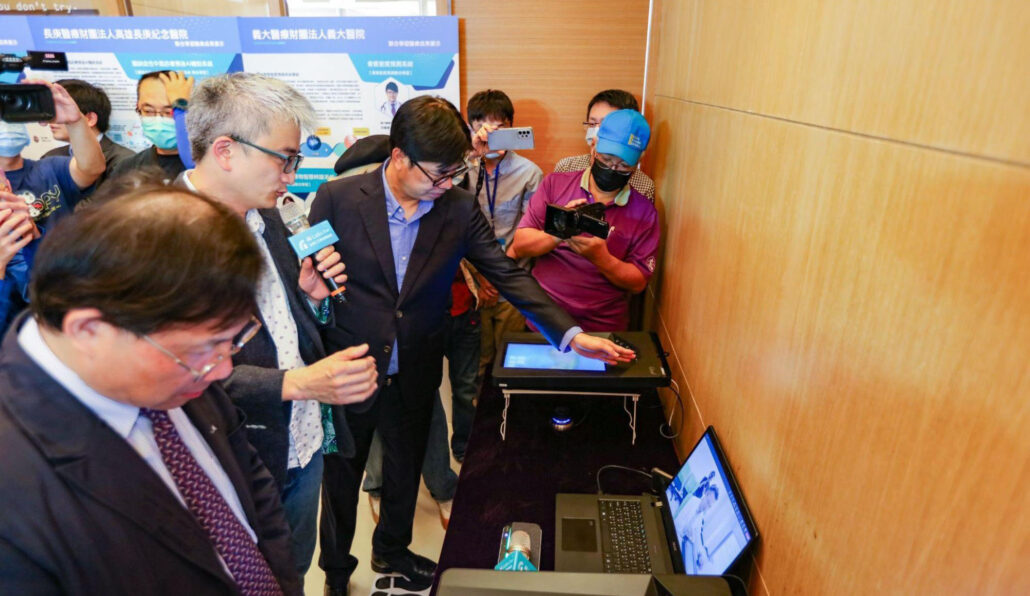
↑Deputy Minister of the Ministry of Economic Affairs, Chuan-Neng Lin, and Mayor of Kaohsiung City, Chi-Mai Chen, experience the Lixel medical solution.
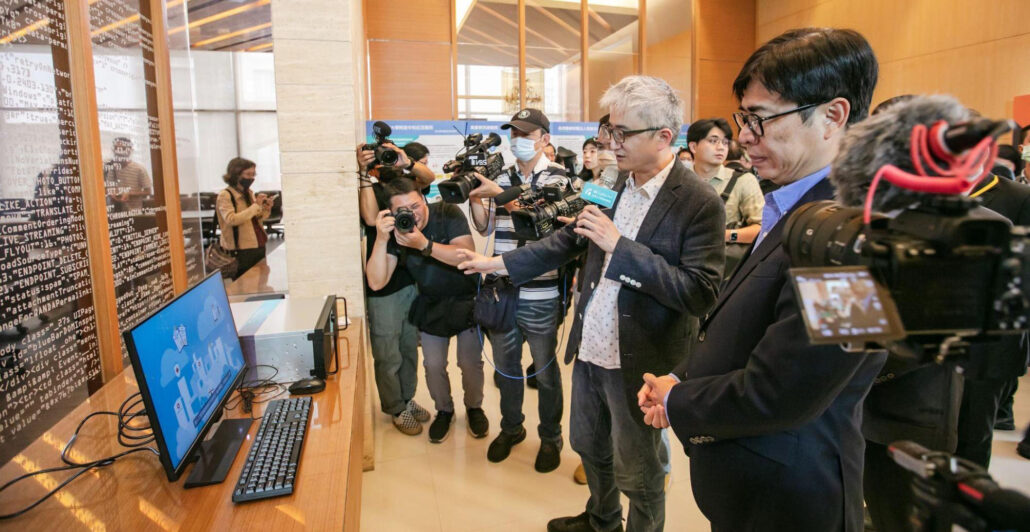 ↑Taiwan AI Labs’ “Federated Learning” machine demonstration
↑Taiwan AI Labs’ “Federated Learning” machine demonstration
The federated learning platform developed by Taiwan AI Labs has been certified by three major medical alliances and multiple hospitals, currently achieving an 80% adoption rate among national medical centers. There are currently nearly 20 clinical research and development projects and over 80 clinical teams involved, with more than 120 cross-institutional models undergoing training and validation.
Apart from the intelligent healthcare sector, Ethan Tu mentioned that federated learning projects are being carried out from the Ministry of Transportation to the financial industry, forming a diverse national team for federated learning across various industries. Taiwan maintains its leading position in the federated learning industry globally, and by leveraging the success of intelligent healthcare applications, the federated learning models will be further promoted in diverse industries, establishing a trustworthy AI-driven industry team in Taiwan. This will expand robust business models and international collaborations for trusted AI, with the results being rapidly disseminated worldwide through testing, verification, and implementation. Ethan Tu emphasized that in the near future, generative AI technology will be widely applied across various industries, and the trustworthy AI developed through federated learning will represent a vast business opportunity, expected to become a multi-billion-dollar industry.

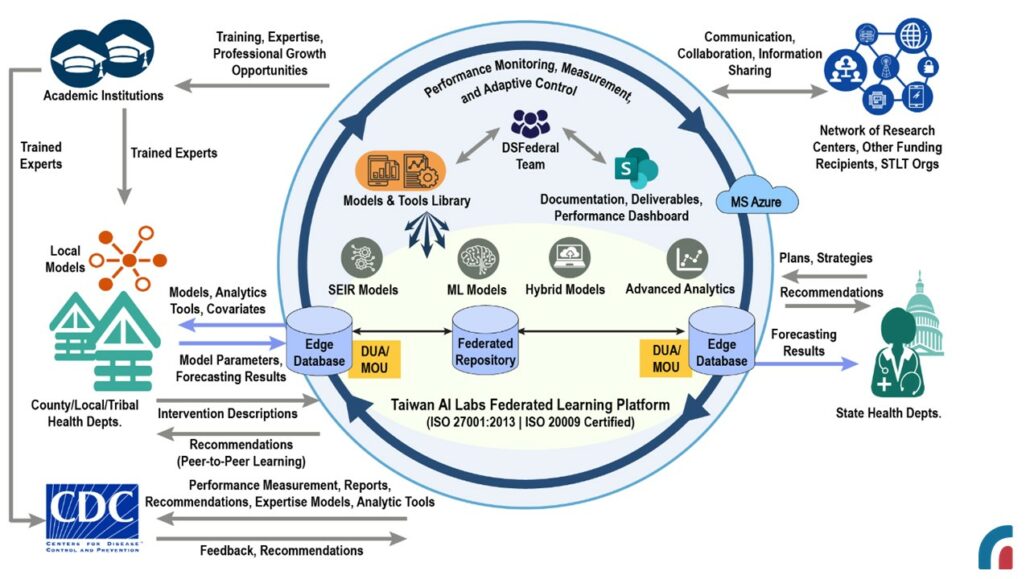
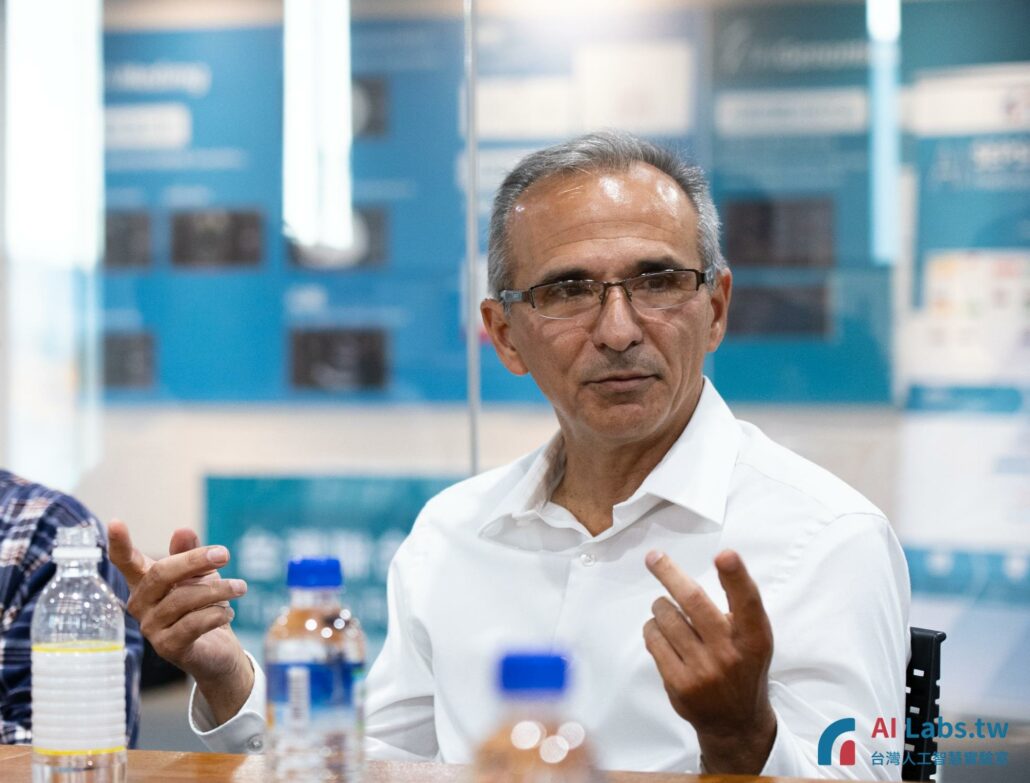

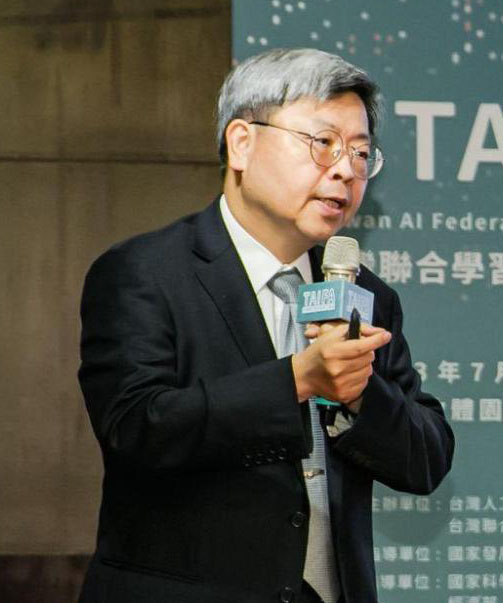
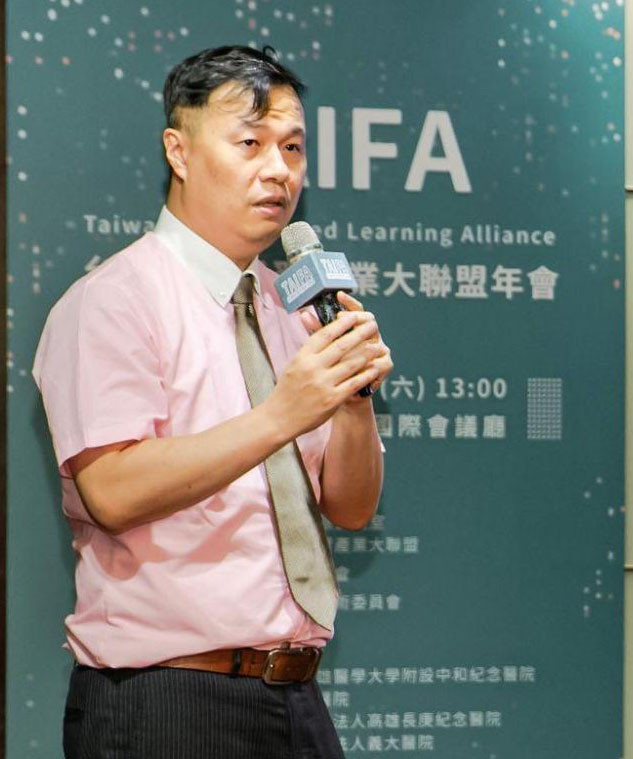 ↑Professor of National Taiwan University Hospital,
↑Professor of National Taiwan University Hospital,